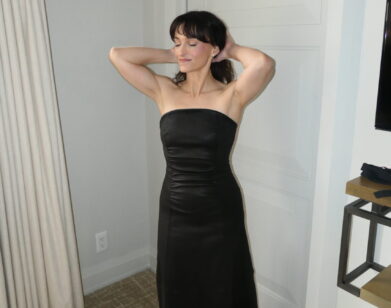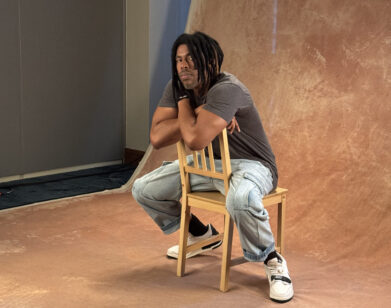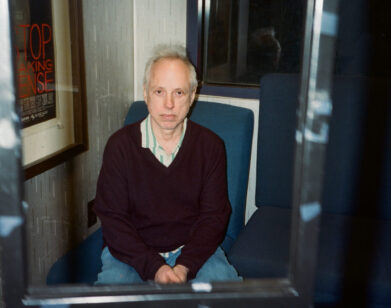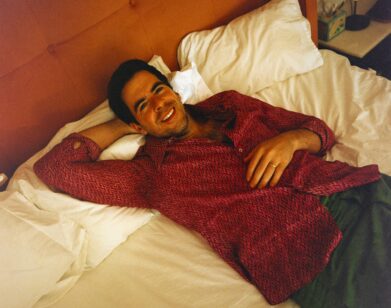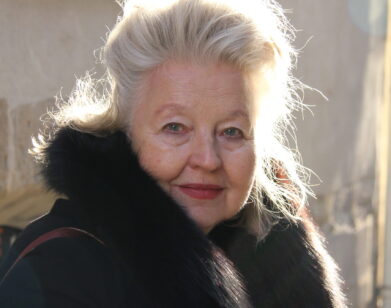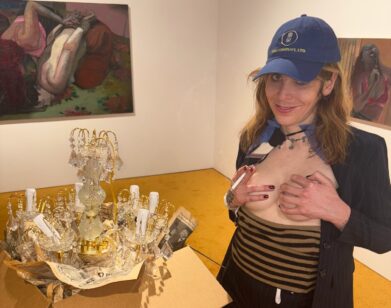Standoff
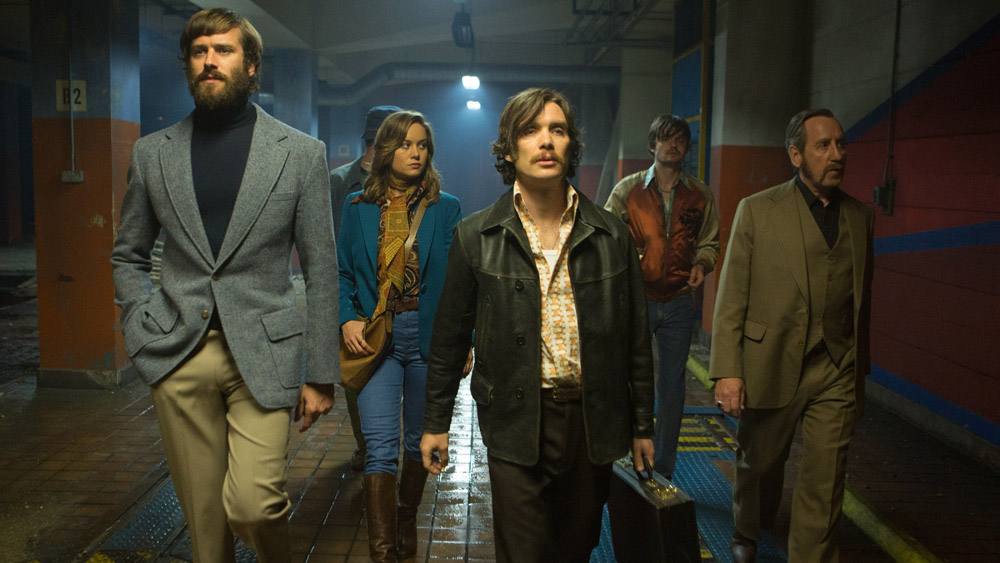
An IRA operative, a beautiful American woman, a South African arms dealer, and some hoodlums walk into a New England warehouse in the 1970s… Free Fire, the latest film from British co-writer-director Ben Wheatley and his wife and filmmaking partner Amy Jump, is a sharp, funny, violent thriller about a gun deal gone wrong with an impressive ensemble cast, including Brie Larson, Cillian Murphy, Armie Hammer, Sharlto Copley, Jack Reynor, Sam Riley, Babou Ceesay, Noah Taylor, and Michael Smiley. Free Fire premiered at the Toronto International Film Festival this past September and opens this week. “I wanted to make an action movie,” says Wheatley, whose past credits include the J.G. Ballard adaptation High-Rise (2016) and the SXSW hit Kill List (2012). “I started looking at ballistics reports and FBI reports of real shootouts, and what was coming across was what a mess everything is,” he continues. “Cinema scenes are quite clean usually, and I wondered what it would be like to put that onto the screen.”
EMMA BROWN: You’ve said you wanted to make an action movie, what made you decide to set Free Fire in the 1970s in Boston? How did the IRA angle come about?
BEN WHEATLEY: I started breaking down what an action film is and trying to think about it procedurally—what are the building blocks of it? I looked at car chases and modern cinema and what makes up an action sequence. I was starting to find a lot of stuff less interesting than I did in ’70s and ’80s movies. The spectacle got so huge that it felt like the people got lost inside it, and I wondered what it would be like if you reduced it to something much smaller and much more personal—a more human scale.
The Massachusetts thing came from Cillian Murphy. I met Cillian; he requested a meeting with me through my agent. We went out and had a drink and got on really well. As he walked away, he was kind of saying, “If you ever got an idea for a role for me, maybe we could work together.” I thought, “I want to write something that he could be in specifically.” Then I thought about Michael Smiley, who I’ve worked with a lot of times—he’s a great Irish actor. I had these two Irish guys, but I also wanted to make something that was set in America. I was thinking about the mobile phone and how it has totally screwed the modern thriller, so I wanted a world where there are no mobile phones. I’d been reading a lot about the Troubles and the Northern Ireland conflict, and I read this story about the IRA buying guns in America and smuggling them on the QE2 back to Belfast.
But I didn’t want to make it really specific otherwise you get tangled up with the world of accents, which don’t necessarily help. It’s been getting that label of being in Boston, but it never says it in the film, and it never says what year it is either.
BROWN: Did Cillian say anything about your past work—that he was a fan of Kill List, for example—when he requested a meeting with you? Does that happen to you a lot?
WHEATLEY: It was because he liked Kill List. That seems to be a film that’s popular with actors, I think because of the naturalistic tone of it. Even though it’s a genre film and a horror film, there’s a lot of performance and heart in that movie. It happens once in a while. I had a similar thing with Reece Shearsmith, who is in A Field in England. He too requested a meeting. But it’s great when actors reach out because it shows that they’re out there stirring the pot, trying to make things happen for themselves. They have an understanding of the landscape of who’s making what, what’s coming up, and who’s doing interesting work. I think that helps. It’s part of developing the whole state of how cinema is; everyone is looking out and engaged rather than [it being] just a financial thing or sitting back, waiting for scripts to turn up.
BROWN: Free Fire has such a great cast, was there anyone who maybe you weren’t familiar with beforehand who just wowed you in an audition?
WHEATLEY: I don’t generally do auditions. We look at interviews with people on television. It’s not that interesting, usually, what they’ve been in in the past because you don’t want that performance anyway. They’ve done it already. I’m interested in them as a person, and sometimes you get a glimpse of that in interviews. We generally re-write after the actors have been cast to fit them tighter and fit the meter of the way that they speak and get the most out of them and what we perceive their characteristics to be. [For Free Fire], we re-wrote all of them, but specifically Sharlto Copley’s character, because that character wasn’t South African originally. He said, “Do you want me to play it as American?” [But] his voice is really good and I like all the clash of the accents in the film, it makes me laugh. I like that confusion when people are speaking in the same language but still can’t understand each other. It’s also usually my experience of being in America—when I speak no one can understand what I’m saying.
BROWN: When you and Amy are writing a film together, do you ever disagree? How do you decide disagreements?
WHEATLEY: We write very differently on every film, but generally we don’t discuss the film between us. Certainly there’s no critiquing of other people’s writing; it’s not like a collaboration you might see in a writer’s room for an American TV show. I’ll write something and then she’ll re-write it, and there’s no conversation unless she’s written something that’s impossible to shoot or too expensive. We’ve been together since we were teenagers and that’s just the way we’ve always worked. Sometimes my scripts get so dissolved, and they’re so different from when I wrote them originally, that I find it hard to find what I wrote in it. But then, over time, I can the shapes of it and the structures of it. Or sometimes she’ll rewrite it so utterly that I’ll have to take my name off it, because it’s nothing left that I did.
BROWN: When you were teenagers, did you ever think, “We’ll make movies together when we grow up”?
WHEATLEY: No, but we’ve always made stuff—always drawn and written together and worked on novels and plays. It’s just a continuation of that work. Film is more of a dream when you’re younger. I found it almost impossible to see how you would get into the industry having no connections, nobody in the family being anywhere near it and never meeting anybody that had been on a set. The first few years, the only film sets I had been on were my own. I’d never even visited another film set. I didn’t know how other people worked. It was all from scratch. People say, “How do you get into the British film industry?” There is no British film industry, there are just people making films and finding their own way. It’s not like in the States where there are studios and there’s an actual infrastructure to it; there’s just nothing here. You make it from scratch a lot of the time.
BROWN: What was the first film set you visited outside of your own?
WHEATLEY: I went on the Game of Thrones set—that was the first proper, big set I went on. I’m very superstitious about going on other people’s sets. You have to ask permission of the director; you shouldn’t just turn up and skulk about in the background. It’s very rude. You have to ask them personally. It’s like a vampire being invited into a house. [With Game of Thrones,] Neil Marshall was directing, and I was there [in Belfast] looking for locations and studios while I was doing High-Rise. I know Neil a little bit, and they said, “Do you want to see what’s going on in Titanic Studios?” and I was like, “Please ask him. I don’t want him to suddenly turn around at the monitor and see me skulking there and go, ‘What the fuck are you doing here?'” [laughs]
BROWN: Did it feel familiar when you were on set? Or did it feel like something you’d never experienced because it’s so huge.
WHEATLEY: Game of Thrones is a difficult one because I am a fan of the show, and it’s the first time I’ve been on something where I was a bit star-struck. They were shooting on this set of the Wall; they were all in costume, obviously, and then I knew a lot of the actors because I’d worked with a lot of people, so it was all a bit confusing. But I did get to sit on the throne later, which was quite exciting.
BROWN: I heard that High-Rise was a very fun set to be on, even though the film is quite dark, and you seem to have a reputation among actors and agents as someone actors love to work with. Were you surprised when you started getting such positive feedback from your cast members? Do you make an effort to make your actors comfortable?
WHEATLEY: I think a big part of my job is to make an atmosphere on set and have an attitude that it’s about experimentation, and you can’t do anything wrong. It’s not about judgment, it’s not about me kicking over a chair and storming onto set and acting stuff out and telling people to copy what I do. That is a style of directing some people have, but I don’t understand it. I like actors a lot. I want the best out of them and I can’t act for shit, so I don’t want to make them copy me because it would be a disaster. [laughs] I’ve had pretty much the same crew for all the films that I’ve made, and I’ve managed to have really nice, calm, funny people. That is a big part of it, a family feeling of warmth and finding something interesting and making a platform for them to perform. It’s a very difficult job, acting, in that it’s totally counterintuitive to how we are brought up. Society is about masks and hiding and pretending to be something that you’re not and not opening up, and in acting, you do all of those things, but it also shows the performers in a very raw state. They have to literally upset themselves to get to that position sometimes. You don’t need a load of people judging you or not being interested in what you’re doing or being an ass on set because it ruins it.
BROWN: Have you ever had a day where you’ve felt that the shot just isn’t going well, and you’re behind schedule, and you’re stressed?
WHEATLEY: Not really. It’s usually alright. In the seven weeks of shooting High-Rise, I think we had an hour of overtime, and the same with Free Fire. I don’t tend to over-shoot. I’ve usually very carefully planned everything and I’m involved in production, so I know how much everything costs. It’s not a badge of honor to over-shoot or to go over-budget for me. It’s a mistake. [laughs]
BROWN: Your films are very different, but one throughline I’ve heard people talk about is that they take place in enclosed spaces.
WHEATLEY: Also all the characters have shoes—it’s a motif that I’ve used in every film. [laughs] They all feel different. They’re all different attitudes, but they’re all the same as well. Your obsessions just bubble up all the time. You’ve always got about four or five scripts on the go at any one time and something might suddenly get financing and something might not. The order that they’re made in is not to be taken as a meaning. There was a specific moment where I sought out a comedy after I got halfway into Kill List, so the way Sightseers worked was a definite choice. Between Sightseers and A Field in England, we were trying to make a much bigger movie that we couldn’t get the financing for and then that changed direction. That was a financial thing that we didn’t really have any control over. High-Rise was just a random thing where I went, “I wonder who’s going to make this book?” They are very difficult critically to talk about as a [single] piece because they’re completely individual movies. I think a lot of [the setting] comes out of budget, because it’s harder to shoot with loads of extras in bigger spaces if you haven’t got any money. There are definitely themes that run through the movies. Some of the movies are about child-men and the women that have to deal with them, and then some of the movies are about the individual fractured into different parts so. I’d say like Down Terrace, Kill List and Sightseers are about the child men and A Field in England and High-Rise are about the fractured psyche.
FREE FIRE COMES OUT THIS FRIDAY, APRIL 21, 2017.

